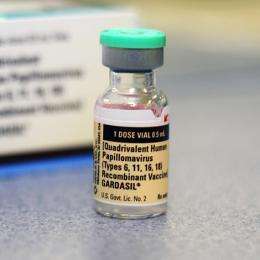More evidence HPV vaccine reduces precancerous lesions

The HPV vaccine has led to a significant reduction in the rate of cervical abnormalities in young New Zealand women, which is likely to result in reduced rates of cervical cancer in future, new University of Otago research reveals.
The survey of 104,313 women, led by Dr. Carrie Innes and Associate Professor Peter Sykes from the University of Otago, Christchurch and published today in the New Zealand Medical Journal, shows the HPV vaccination has led to a significant reduction in high-grade cervical abnormalities in women, especially those vaccinated prior to 18 years of age.
"We would expect that this would result in lower rates of cervical cancer among these women as they age," Dr. Innes says.
The human papillomavirus (HPV) is the main cause of cervical cell abnormalities and cervical cancer. An HPV vaccine offering protection against four HPV types was first licensed in New Zealand in 2006 and a national HPV vaccination program began in New Zealand in 2008.
When introduced, the vaccine was offered to young women born in 1990 and 1991—who were then aged 17 to 18 years old. In 2009, the HPV vaccination program was extended to girls and young women born from 1992 onwards. In 2017, a new HPV vaccination covering more HPV types became available, fully-subsidized in New Zealand for both boys and girls.
Results from the research show that when compared with unvaccinated women, women who had a least one dose of the four-type HPV vaccine prior to 18 years of age had a 31 percent lower incidence of high-grade cervical cell abnormalities when they were aged 20 to 24 years.
However, there was only a small relative decrease in high-grade cervical cell abnormalities within the time frame of the study for women vaccinated after 18 years of age.
In this cohort of screened women, Māori were less likely to be vaccinated but, if they were, vaccination offered similar protection for both Māori and non-Māori women.
Associate Professor Sykes explains that the study confirms that HPV vaccination will offer protection against cervical cancer and also provide opportunities to reduce inequities.
"Efforts should focus on increasing the relatively low HPV vaccination rates in New Zealand.
"However, the study also demonstrates that both HPV vaccinated and unvaccinated women can develop high-grade cervical disease. This underlines the ongoing need for cervical screening in both HPV-vaccinated and unvaccinated women."
















